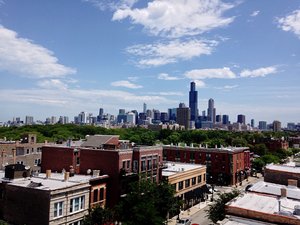There are roughly 27,000 private and government-owned surveillance cameras in Chicago.
Not interested in Big Brother tracking your movements? A Chicago maker has created glasses, called Reflectacles Ghost, that will reflect light--both infrared and visible--making your face unrecognizable to facial recognition software used in surveillance. The project has caught on amongst privacy advocates in Chicago (which has a long history of surveillance) and beyond, even garnering a retweet from Edward Snowden. And it's coming amidst growing conversation around privacy and surveillance worldwide.
Ghost is the second line of Reflectacles from Scott Urban, a Chicago maker who has created custom glasses for the likes of chef Graham Elliot and comedian Reggie Watts. In November, he launched a Kickstarter campaign for his original line of Reflectacles--glasses made with a reflective material that can be seen up to 1,000 feet away, geared toward night bikers who want to be seen by oncoming traffic and club kids looking for a fashion statement.
When he launched the Kickstarter campaign, an early backer asked if he would consider toying with infrared reflecting material, which reflects the light used by security cameras in low light. Urban, who's passionate about issues around privacy and surveillance, happened to have some material on hand. A month of tinkering later, he was able to add the "Ghost" option to Kickstarter backers, and he said 85 to 90 percent switched their order to include the infrared reflecting option.
Urban's Kickstarter was successfully funded, raising $41,315 to manufacture Reflectacles. Orders are expected to be shipped June 2017, and those who didn't fund the Kickstarter can preorder the Ghost frames for $125 on the Reflectacles site.
Backers ranged from a businessman in China to a small business owner, all who were concerned about increased surveillance in their city and around the world, said Urban.
"As the surveillance grid grows, there are many people who would prefer to preserve their identity from being constantly on record," Urban told Chicago Inno over email. "This new pair is by no means the end-all of surveillance, but in many situations it allows the wearer to opt out from their every action being cataloged."
A number of artists and technologists creating wearable privacy gear have recently popped up: Chicago's UMRE Surveillance creates anti-surveillance products, such as masks and t-shirts, and Berlin-based artist Adam Harvey recently unveiled Hyperface, a textile pattern with shapes that mimic eyes, nose and mouths, meant to overwhelm facial recognition technology.
Facial recognition is particularly contentious in Chicago as Illinois is one of the only states nationwide to have a law regulating biometric data, which has spawned a flurry of lawsuits against Facebook and Google for collection of facial data. Chicago also has a long history of heavy surveillance, and abuses, starting with the "Red Squad" which unlawfully gathered information on political dissidents, all the way up to thousands of video cameras installed in the mid-2000s as a means of monitoring violence (a system criticized for lack of oversight in a December report by Illinois' inspector general). The city has implemented surveillance in everything from Stingrays, which can intercept cell phone communication, to Shotspotter, an audio system that monitors for gunshots (Lucy Parsons Lab has an overview of Chicago's surveillance methods, which you can peruse here).
"Surveillance comes in lots of forms, and cameras are just one form of surveillance," said Rajiv Shah, an adjunct professor at University of Illinois Chicago, who has extensively researched surveillance. "Our credit cards keep track of all our transactions...There are lots of ways to track people's movements besides using cameras."
Reflectacles may just tackle one part of the fight for privacy, he said, but they'll likely be effective.
"With respect to cameras, it is going to have an impact if you’re looking for the face of somebody," said Shah. "Using facial recognition technology, it’s going to make it a bit more difficult."








